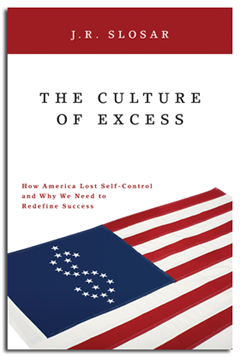The Culture of Excess
A book by Dr. J. R. Slosar
How America Lost Self-Control and
Why We Need to Redefine Success
America has spun out of control. Just look at the facts: individuals, companies and the government amass huge, financial debts.
Our markets collapsed due to unfounded speculation and the overextension of credit to people who never should have been lent money. We’re overweight and over-medicated, and our relationships are strained. We are anxious, we lose patience quickly, and we’ve multi-tasked ourselves to the point we’re losing our ability to think and make decisions. We live in an age of excess consumption, unmerited expectations, unbridled greed, and an unfounded sense of entitlement. We suffer from cultural narcissism. But there is a cure to our ills.
A new book goes to great lengths to explain what is happening to us and provides a solution to ensure our nation moves from Generation Me to Generation We.
Pointing to “out of control capitalism,” “consumerism overload” and “hyper-technology coupled with media” as the main culprits, Jay Slosar, Ph.D., leans on original research and 25 years as a licensed psychologist to put forth a provocative examination of the pitfalls facing our culture and society in a new book, The Culture of Excess: How America Lost Control and Why We Need to Redefine Success (Nov. 1, ABC-CLIO).
Dr. Slosar believes today’s high levels of cultural narcissism has been fueled by the wild growth of technology and expansion of screen media (i.e. — social networking, ipods, texting, etc.) coupled with a news media that focuses too often on entertainment, and extreme market forces that make consumers crave what they can’t afford to attain.
“The changes in development of today’s youth are profound as the interaction of economic and social trends have dramatically affected self-control and how we define success,” says Dr. Slosar. “My book focuses on how to stop and change these trends, and how to cope as individuals, parents, and decision-makers.”
The Culture of Excess addresses the following important issues.
- How cultural narcissism leads to an increase in immediacy and expectations, resulting in impulsivity, lack of self-control, exaggerated risk-taking, and increased deception.
- Why we must redefine our definition of success. Today’s emphasis on materialism, consumption and wealth has failed to produce health and happiness.
- How the cumulative effects of cultural narcissism lead to an unaltered sense of reality for the individual. The psychological development changes our sense of self and identity.
- Why we must not see government as evil but rather as the solution to our problems. A nation of less government and deregulation has brought us to the brink of financial and societal bankruptcy.
- How to overcome the burden of perfectionism.
- How parents can raise a healthier generation so their attitudes and ethics are aligned with the demands of reality.
- Why significant media reform is needed.
- How to choose between capitalism and democracy so that a new economic philosophy can be launched and ground rules can be created to guide day-to-day transactions.
- Why the way someone becomes a hero today impacts the society that worships them.
- How to develop your own identity amidst a culture of narcissism.
- How the issue of health care reform — as well as our recent economic collapse — serve as glaring examples of what’s wrong with our culture of narcissism.
- Why parents must set tighter boundaries and stronger limits for their children’s behavior.
- Why too many of us have unreasonable expectations of becoming rich entrepreneurs overnight, suffering from entrepreneurial narcissism.
- The role of government deregulation as a major contributor to declining self-control.
Dr. Slosar presents evidence that America is suffering from unrealistic and unlimited expectations of how we should each be living a rich life. By overindulging and over-praising our children we’re raising a generation that lacks self control and who will continue our cycle of cultural excess. Though the financial collapse of Wall Street exposed a nation living beyond its means, we must come away understanding the psychological factors that underlie our lifestyle and to take steps to change.
“Culture trumps personality,” says Dr. Slosar. “It impacts our thinking, personality development, and day-to-day living. Losing our sense of reality is becoming normalized. We’re in serious danger of losing control of our lives. A dysfunctional system can’t self-correct.”
The Culture of Excess challenges existing and entrenched beliefs and exposes how techno-thinking dominates our lives. Most importantly, it provides a road map for all of the key forces of society, including parents, educators, politicians, sports heroes, and billionaires to make significant strides towards reform.
Featuring numerous vignettes and case studies, dozens of research citations at the end of each chapter, an extensive bibliography referencing 75 professional journals and 48 books, and a comprehensive index, The Culture of Excess is the first book to assess the impact of economic and social factors on the nation’s psychological well-being. Dr. Slosar diagnoses the psychological engines of this indulgent age and offers his prescription for helping “Generation Me” become “Generation We.”





